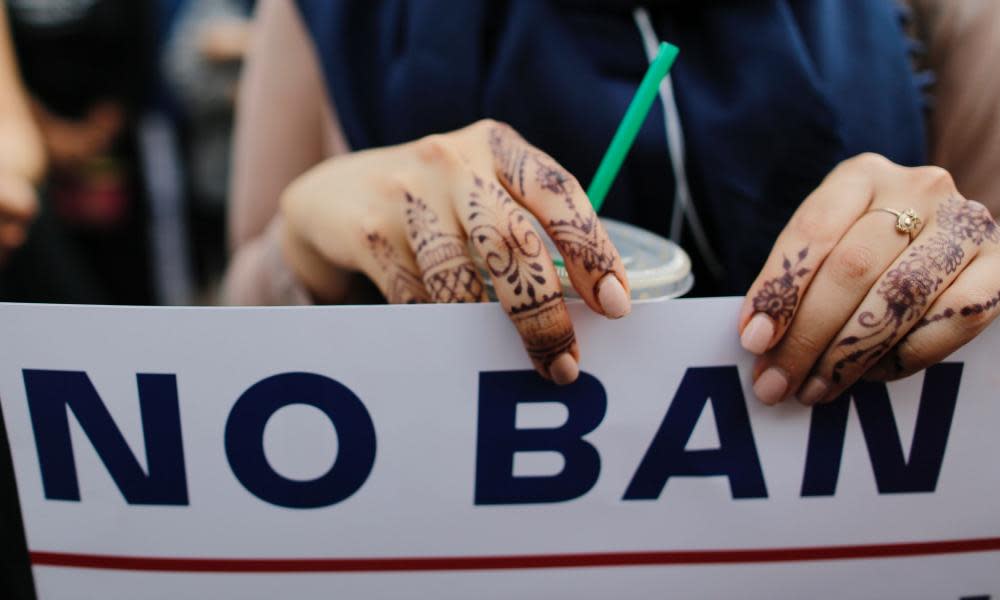Syrian girl disfigured by bomb attack refused US visa under Trump travel ban

A 16-year-old Syrian refugee who was disfigured in a bomb attack on her home has been refused a visa to get medical treatment in the US because of Donald Trump’s travel ban, the Guardian can reveal.
Marwa al-Shekh Ameen resettled with her family in Germany, but doctors there encouraged her to seek more sophisticated medical treatment in America following 13 operations to repair trauma from third-degree burns to her face, arms and chest.
Shriners Hospitals for Children in Boston scheduled an appointment to treat Marwa in November 2018 and a volunteer agency in Massachusetts offered to provide temporary housing for her and her father. But the US government denied her visa on 20 December, claiming there was not enough evidence to prove she would return to Germany.
This has stunned Marwa’s supporters, who emphasized that all six of her siblings, including a twin sister and her parents, grandparents and uncles have resettled in Germany and were integrated into their new home near Nuremberg.
Marwa’s uncle, Nael al-Shekh Ameen, said in an email: “If Shriners believes they can improve Marwa’s quality of life surely anyone with any sense of compassion would not deny her this vital treatment.”
The US government, however, has made it extremely difficult for people from seven countries, including Syria, to enter the US under the revised version of Trump’s travel ban.
Consular offices can issues visa waivers on a case-by-case basis, but advocates have warned these waivers are rarely granted and the process for getting one lacks transparency.
Of the more than 33,176 visa applications from countries covered by the ban, about 2% were granted waivers from December 2017 to 31 May 2018, according to the state department.
Last month, a Yemeni mother was only granted a visa to visit her dying two-year-old son in California after her case received worldwide attention. She had been repeatedly denied the visa before, but made it to California a week before he died.
The state department said in a letter to Marwa that her visa was rejected because her application did not prove she would return to Germany. The state department would not provide further information to the Guardian because visa records are confidential.
“Marwa and her family were devastated,” Shekh Ameen said. “They were full of hope that the visa would be issued. Marwa was saddened to think that human rights doesn’t count any more.”
Shekh Ameen said after Marwa’s visa was denied, the teenager stopped eating properly and was feeling unwell at school and at home. German doctors referred her to a psychiatric clinic because of her distress over not being able to get the reconstructive surgery she so desperately wants.
In 2016, Marwa’s face was burned after a kerosene lamp ignited and exploded in the room she was in during a bomb attack near her home in Syria. Her family fled Syria for Turkey, where she received her first treatment for wounds that have left her face a bright pink and white. Severe trauma to her arms and hands has left her fingers brown and mangled and the skin around her eyes has changed shape.
Despite these severe injuries, Marwa’s uncle said she is close with her siblings and likes to listen to music and uses social media like any other teenager. Last year, her family was thrilled to see her rap onstage with classmates in front of a crowd of 200 people during a music festival near her home outside Nuremberg.
The state department said Marwa can reapply for the visa, but it is unclear how she can provide further proof of her ties to Germany.
Two members of German parliament, Britta Dassler and Martina Stamm-Fibich, wrote in support of Marwa’s case this week and said there was no reason to believe she would seek to stay in the US because of her and her family’s strong ties to their community in Germany.
“We are impressed by the bravery the young Ms al-Shekh Ameen has demonstrated and her exemplary integration into our city and community,” their letter said.
“Ms al-Shekh Ameen and her family epitomize the potential of a family that has suffered much hardship to integrate into their new life here in Germany,” they continued. “The family has overcome significant obstacles in order to remain together.”
But a similar message sent in August 2018 by US senators Elizabeth Warren and Edward Markey failed to sway the US government.
“Ms al-Shekh Ameen’s story, in the way that she continues to carry herself as a beacon of hope and support after experiencing such trauma, is one of outstanding resilience and courage,” the senators wrote.
In response, the state department told Warren’s office it was Marwa’s responsibility to prove she would return to Germany.

 Yahoo News
Yahoo News 
